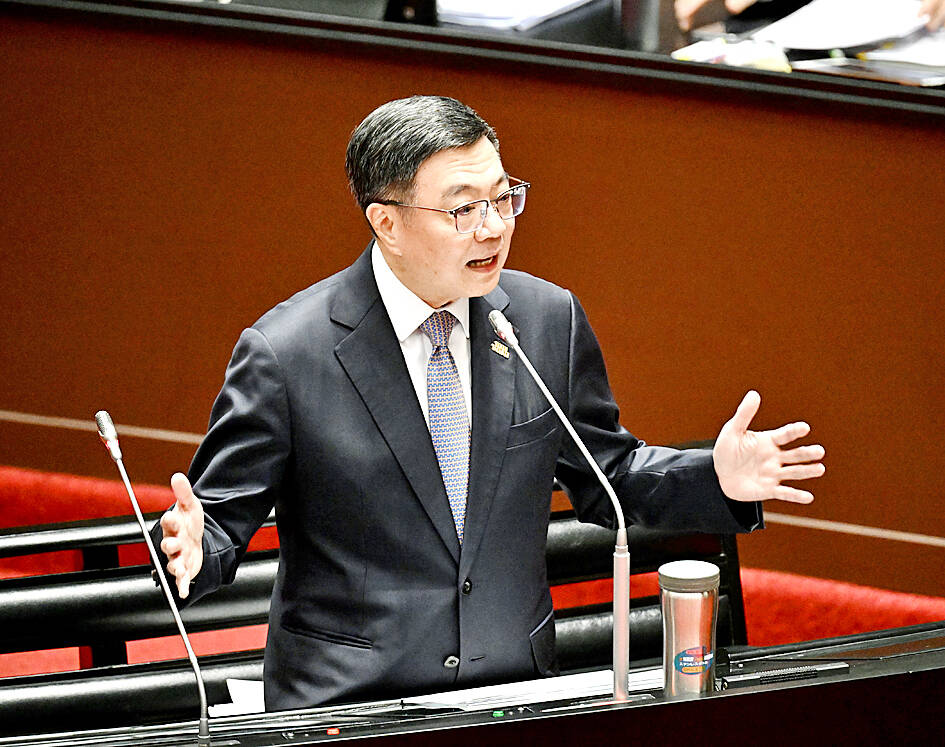Premier Cho Jung-tai (卓榮泰) described a decision by lawmakers to send the central government budget for fiscal year 2025 bills back to the Legislative Yuan’s Procedure Committee on Friday as “regrettable.”
The decision means the budget bills did not go through their first reading, which is required before they can be sent to the respective legislative committees for further review. The Procedure Committee would now have to determine whether the bills would be sent to a full session again.
During Friday’s session, the first day of the new legislative session, independent Legislator May Chin (高金素梅) proposed that the central government budget bills for the fiscal year of 2025 be sent back to the Procedure Committee.

Photo: Lo Pei-de, Taipei Times
The opposition Chinese Nationalist Party (KMT) and the Taiwan People’s Party, who have a combined majority in the 113-seat legislature, backed Chin’s proposal, and 59 of the 105 lawmakers present voted in favor of the motion.
However, the main focus of the ongoing legislative session is to pass the government budget for the following year by the end of December.
The proposed central government budget for the fiscal year 2025 covers record-high spending of NT$3.33 trillion (US$104 billion) and estimates total tax revenue and other proceeds to be NT$3.15 trillion.
The difference between the proposed total spending and expected revenue, which is about NT$178.9 billion, would be made up through borrowing, the Executive Yuan said.
Following the vote on Friday, Cho delivered a report on government administration and the formulation of the budget, but went off script and criticized the lawmakers’ actions.
“As long as we offer a proper explanation, [I believe] the legislature will understand,” the premier said.
Executive Yuan spokesperson Michelle Lee (李慧芝) said that government agencies would continue to communicate with the legislature while maintaining stability and accountability.
Lee said the government agencies would explain to the public that the record budget allows the administration to implement policies to expand social welfare and medicine coverage, and maintain national defense and social security.
In a statement, the KMT caucus said the budget bills were sent back in protest because the administration ignored laws and resolutions passed by the legislature regarding the proposed budget.
The KMT caucus condemned the Ministry of Agriculture for failing to include in its budget a resolution passed by the legislature on July 16 to raise the price for the government’s acquisition of public food stock, which is currently NT$26 per kilogram, by at least NT$5 per kilogram.
The legislature also amended the Logging Ban Compensation for Lands Reserved for Indigenous Peoples Act (原住民保留地禁伐補償條例) on June 4, raising the annual compensation from NT$30,000 per hectare to NT$60,000 per hectare next year, which would increase the budget set aside for compensation from NT$2.1 billion per year to NT$4.2 billion per year.
However, the Council of Indigenous Peoples only lists NT$2.81 billion for compensation payments in its budget for fiscal year 2025, which is below the estimated amount needed under the amended law, the KMT caucus said.
It also questioned the large amount of money the government would allocate to the state-owned Taiwan Power Co to subsidize its heavy losses caused by maintaining policy rates set by a Ministry of Economic Affairs electricity tariff review board.
In the 2025 budget, NT$100 billion would be allocated to support the power company’s finances.
The increase in the government’s advertising, marketing and communications expenditure budget to promote policies, programs and projects to the public is too high, the KMT caucus said, citing these issues as why they demanded the Executive Yuan revise the proposed budget bills before sending them to the legislature.

Trips for more than 100,000 international and domestic air travelers could be disrupted as China launches a military exercise around Taiwan today, Taiwan’s Civil Aviation Administration (CAA) said yesterday. The exercise could affect nearly 900 flights scheduled to enter the Taipei Flight Information Region (FIR) during the exercise window, it added. A notice issued by the Chinese Civil Aviation Administration showed there would be seven temporary zones around the Taiwan Strait which would be used for live-fire exercises, lasting from 8am to 6pm today. All aircraft are prohibited from entering during exercise, it says. Taipei FIR has 14 international air routes and

The Ministry of National Defense (MND) today released images of the military tracking China’s People's Liberation Army (PLA) movements during the latest round of Chinese drills around Taiwan. The PLA began "Justice Mission 2025" drills today, carrying out live-fire drills, simulated strikes on land and maritime targets, and exercises to blockade the nation's main ports. The exercises are to continue tomorrow, with the PLA announcing sea and air space restrictions for five zones around Taiwan for 10 hours starting from 8:30am. The ministry today released images showing a Chinese J-16 fighter jet tracked by a F-16V Block 20 jet and the

Snow fell on Yushan (Jade Mountain, 玉山) yesterday morning as a continental cold air mass sent temperatures below freezing on Taiwan’s tallest peak, the Central Weather Administration (CWA) said. Snowflakes were seen on Yushan’s north peak from 6:28am to 6:38am, but they did not fully cover the ground and no accumulation was recorded, the CWA said. As of 7:42am, the lowest temperature recorded across Taiwan was minus-5.5°C at Yushan’s Fengkou observatory and minus-4.7°C at the Yushan observatory, CWA data showed. On Hehuanshan (合歡山) in Nantou County, a low of 1.3°C was recorded at 6:39pm, when ice pellets fell at Songsyue Lodge (松雪樓), a

NO SHAME IN RETREAT: Hikers should consider turning back if the weather turns bad or if they do not have sufficient equipment, the Taroko park headquarters said Two people died of hypothermia over the weekend while hiking on Hsuehshan (雪山), prompting park authorities to remind hikers to bring proper equipment and consider their physical condition before setting out in the cold weather. Temperatures dropped over the weekend, bringing snow to high altitudes in Shei-pa National Park. One hiker, surnamed Lin (林), who on Friday was traveling with a group of six along the Hsuehshan west ridge trail, lost consciousness due to hypothermia and died, the Shei-pa National Park Headquarters said. On Saturday, another hiker, surnamed Tien (田), in a group of five on the southeast of the west